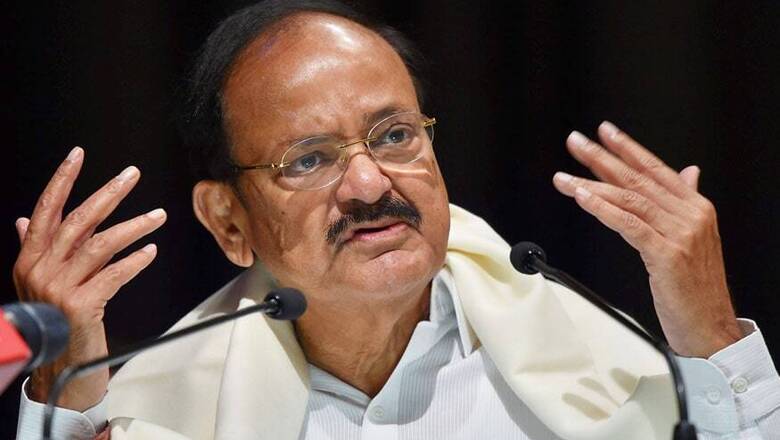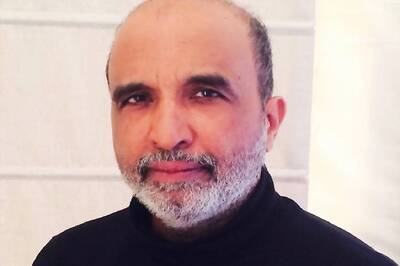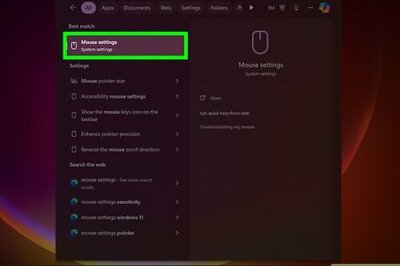
views
Hyderabad: Vice President M Venkaiah Naidu on Saturday said ace shuttler PV Sindhu was the pride of the nation and athletes like her were role models for the youth. Naidu spoke to reporters at his residence in Hyderabad after Sindhu, the Indian to win the BWF World Championships, called on him along with her parents.
Hailing her hard work, dedication, and commitment, he said Sindhu was a great inspiration for Indians. While complimenting Sindhu for following a strict diet and rigorous practice regimen to achieve her goals, Naidu said that the ‘Fit India’ call given by Prime Minister Narendra Modi should become a national movement. He said such efforts were extremely relevant at a time when non-communicable diseases were on the rise due to change in lifestyle and dietary habits.
The Vice President said that India had a great demographic dividend with 65 per cent of its population below 35 years of age and observed that it was necessary to have a healthy, active and productive young population to take the country to greater heights.
Meanwhile, speaking at inaugural event of ‘Deccan Dialogue' conference on 'economic diplomacy in the age of disruptions’ at the Indian School of Business (ISB), Naidu said reforms should be brought in in international political and financial institutions to make them more representative of ground realities
“What we need is reformed multilateralism to face the headwinds of protectionist tendencies. We need to bring about the much-needed reforms in international political, financial, and business institutions so that they are more representative of the ground realities and adopt to respond to new challenges," he said. He said India supported a rules-based multilateral order to tackle common challenges such as climate change, technology divide, trade disputes, terrorism, connectivity and maritime threats.
“But, when we are faced with the issues of unilateralism and protectionism, we need to be conscious of the fact that it was India and other developing countries which have earlier made a clarion call to reform the multilateral system as it exists so that the developing countries have a greater voice in the global governance. Consequently, it is not our case to go back to the status quo on multilateralism," he said.
On the need to democratise the United Nations Security Council, Naidu said, "One-sixth of the world population lives in India, and India is not a member of the United Nations Security Council. That's why we have been saying you need to democratise United Nations Security Council.”
Maintaining that India never attacked any other country, he said it would, however, give a befitting reply if anyone interfered in its internal affairs. “This has to be understood by one and all, including the neighbour who is aiding and abetting, funding, training terrorism," he said in an apparent reference to Pakistan.
Describing terrorism as an "enemy of humanity," he said no religion supports the scourge. Observing that older patterns of trade and commerce were in the process of an ongoing paradigm shift, Naidu said, "The rules-based, anti-discriminatory and all-inclusive multilateral trading system centred around the UN, the WTO and the international law, is facing an uncertain future."
In the face of ongoing transformations, it becomes all the more important that the efforts towards making global governance more representative are supported, he said. Irrespective of its failings and drawbacks, it must be acknowledged the process of globalisation opened up a world of possibilities, he added.
Highlighting the role of technology in shaping the current economic and trade system, Naidu said India believes that embracing new technologies is a necessity for developing countries to leap-frog into the 4th industrial revolution era, he said. For this to happen, there is a need to look at appropriate frameworks for international cooperation at the global and regional levels that can avoid the digital divide, he said.
Union Minister of State for External Affairs V Muraleedharan spoke about multilateralism coming under threat in the age of disruptions. He said rapid changes are being witnessed "in the way the world works". Though change happens all the time, its extent and pace now is like never before and the consequences would be, for that reason, would also be difficult to predict, he said.
(With inputs from PTI)

















Comments
0 comment